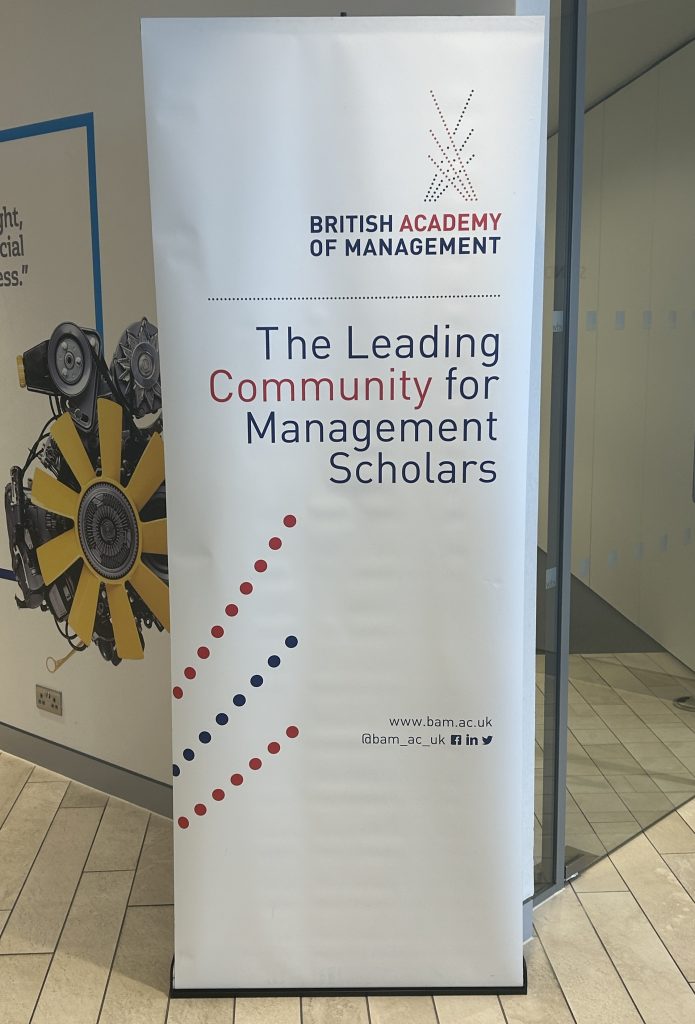The British Academy of Management (BAM) Management Knowledge and Education (MKE) Teaching Practice Conference 2025 brought together educators, practitioners and thought leaders from across the UK to explore how management education must evolve in response to global challenges.
Held at Warwick Business School’s campus in London, this year’s event focused centred around the theme: “Innovating management education for a sustainable and responsible future.”
Representing Salford Business School were Dr Maria Kutar, Dr Divya Patel, Professor Marie Griffiths, and Tracy Dixon – each sharing innovative approaches that reflect the school’s commitment to embedding sustainability, ethical leadership, and innovation across teaching practice.

Rethinking Postgraduate programmes for a sustainable, ethical, and AI-ready future
Professor Marie Griffiths, Professor of Digital Technologies in Organisations, delivered a session titled “Rethinking postgraduate programmes for a sustainable, ethical, and AI-ready future,” on behalf of herself and Dr Yun Chen, Associate Professor and Subject Group Head.
The presentation drew on the redesign of the MSc Managing Innovation and IT (information technology) and the development of MSc Managing AI (artificial intelligence) in Business. The session explored three key areas of curriculum innovation:
- Embedding sustainability:
The revised programmes are closely aligned with the United Nations sustainable development goals (SDGs). Modules such as AI Sustainability and Governance emphasise ethical leadership, while circular economy principles and carbon footprint certification have been integrated into the wider curriculum.
- Reimagining assessment:
To promote academic integrity and student engagement, a continuous assessment model has been introduced using weekly journals/event logs and mini-vivas. This approach has boosted student engagement, attendance, and academic integrity in the age of AI.
- Enhancing delivery:
A range of interactive, student-centred approaches have been introduced, including AI-powered tools, LEGO Serious Play®, student-led AI bootcamps, and regular wellbeing check-ins. These are designed to support both academic success and personal development, especially for international students adjusting to new learning environments.
The work directly aligned with the conference theme by embedding sustainability, ethics, and innovation at the core of management education.
Using immersive technology to teach gender equality
Dr Divya Patel, Lecturer in Business Strategy, presented her paper “Embedding virtual reality (VR) simulations in gender equality education,” which explored how immersive technology can bring complex social issues to life in the classroom.
As part of her level six module, gender inequality in organisations and society, Dr Patel integrated a VR simulation from Bodyswaps, designed to address gender bias in workplace settings. Through this simulation, students stepped into the shoes of individuals experiencing microaggressions and exclusion. The “body-swapping” feature allowed them to view interactions from another character’s perspective, deepening their understanding and empathy. The experience challenged students to reflect on their own responses and develop strategies to intervene in non-inclusive scenarios.
Implementing such an approach raises critical questions: how can students who feel discomfort during immersive experiences be supported? How do we ensure the session is inclusive for all learners, especially those who may be neurodivergent or unfamiliar with VR technology? These questions sparked valuable conversations at the conference and remain at the forefront of Dr Patel’s practice as she continues to refine the use of VR in the curriculum.
Transforming teaching and assessment practice to improve engagement and submission rates
Tracy Dixon, Lecturer in People Management, Foundation Programme Lead and EDI Lead for Students, delivered a presentation on the work being done at Salford to improve the Foundation Year experience for students.
Her session focused on the shift to programme-based learning, where modules are intentionally linked and collaboratively delivered. Module leaders work together to ensure they all know what each is delivering in the week and apply it to their sessions as well. This approach helped students to see how the modules fit together in employment and now their understanding of the topics and how to apply theories have improved.
Assessment has also been reimagined, replacing traditional individual assignments with a synoptic assessment day that covers all three modules. On the day, students take part in a variety of tasks designed to reflect the way knowledge is integrated and applied in graduate employment. Activities include two-part multiple-choice tests and interactive group exercises, which have demonstrated deeper levels of learning.
Student feedback has been highly positive, with many commenting on how beneficial they had found the teaching, and how much they had enjoyed the assessment days. Among 140 participating students, a 94% first-time pass rate was achieved prior to summer resits – a clear indicator of the improved engagement and outcomes driven by the new approach.
Tracy’s presentation prompted lively discussion at the conference, inspiring attendees to reflect on how similar strategies could enhance engagement and outcomes in their own teaching contexts.
Looking ahead
The BAM MKE Teaching Practice Conference offered a valuable platform to connect with educators from across the UK and share practice that is shaping the future of business education.
The presentations from Salford Business School colleagues demonstrated our clear commitment to innovation, placing sustainability, inclusivity, and real-world relevance at the heart of our teaching.